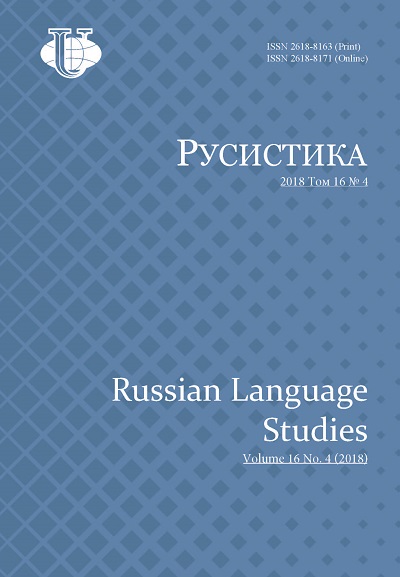The student’s book “Practical lexicology of the Russian language”: traditions and innovations
- Authors: Petrov A.V.1, Petrova L.A.2
-
Affiliations:
- Vernadsky Crimean Federal University
- Crimean Engineering and Pedagogical University
- Issue: Vol 16, No 4 (2018)
- Pages: 464-477
- Section: Methods of teaching russian as a foreign language
- URL: https://journals.rudn.ru/russian-language-studies/article/view/20269
- DOI: https://doi.org/10.22363/2618-8163-2018-16-4-464-477
Cite item
Full Text
Abstract
The article describes the structure and content of the author’s manual on the lexicology of the modern Russian language. The book is based on the concept of Professor O.M. Sokolov, revealing the system in vocabulary based on the matrix distribution of lexical categories. The main directions of factual material study are determined, one of which is identifying the connection between the morphemic structure and the lexical meaning of the word. The sememe typology is specified, the semantic processes accompanying functioning of lexical and grammatical semantics in speech constitute its integral part. The article shows the necessity of isolating the polarization process. In order to demonstrate the system in the vocabulary a paradigmatic aspect is chosen. This aspect is complemented by syntagmatic, derivational and variant relations. It also offers tasks based on the onomasiological approach, which is inherent for the national picture of the world. The presented model of systemic nature helps to form an integral view of Russian lexis. The article generalizes the experience of teaching the course «Lexicology» in higher education.
About the authors
Alexander Vladimirovich Petrov
Vernadsky Crimean Federal University
Author for correspondence.
Email: liza_nada@mail.ru
Doctor of Philology, Associate Professor, Head of the Department of Russian, Slavic and General Linguistics, Faculty of Slavic Philology and Journalism, Taurida Academy of the Crimean Federal University of V.I. Vernadsky
4 Akademika Vernadskogo Ave., Simferopol, Crimea, 295007, Russian FederationLuisa Aleksandrovna Petrova
Crimean Engineering and Pedagogical University
Email: nlla@mail.ru
Doctor of Philology, Professor, Head of the Department of Russian Philology of the Crimean Engineering and Pedagogical University
8 Uchebnyi Lane, Simferopol, Crimea, 295015, Russian FederationReferences
- Kalinkin, V.M. (1999). Teoriya i praktika leksikografirovaniya poe`tonimov (na materiale tvorchestva A.S. Pushkina) [Theory and Practice of Poetry Lexicography of Poetics (on the Material of A.S. Pushkin’s Works)]. Donetsk: Yugo-Vostok Publ. (In Russ.)
- Mikhaylov, V.N. (1965). Sobstvenny’e imena kak stilisticheskaya kategoriya v russkoj literature [Proper Names as a Stylistic Category in Russian Literature]. Lutsk. (In Russ.)
- Rakhmanova, L.I., & Suzdaltseva, V.N. (1997). Sovremennyi russkii yazyk. Leksika. Frazeologiya. Morfologiya: uchebnoe posobie [Modern Russian language. Vocabulary. Phraseology. Morphology: textbook]. Moscow: MGU Publ.; «CheRo» Publ. (In Russ.)
- Otin, E.S. (2004). Predislovie. Slovar konnotativnykh sobstvennykh imen [Foreword. Dictionary of Connotative Proper Names]. Donetsk: Yugo-Vostok Publ. (In Russ.)
- Samotik, L.G. (2012). Leksika sovremennogo russkogo yazyka: uchebnoe posobie [Vocabulary of the modern Russian language: textbook]. Moscow: Flinta Publ. (In Russ.)
- Yevgenevoy, A.P. (1981—1984). Russian language dictionary. Moscow. (In Russ.)
- Maksimova, V.I. (2015). Sovremennyi russkii literaturnyi yazyk. Praktikum: uchebnoe posobie [Modern Russian Literary Language. Practicum: textbook]. Moscow: Yurayt Publ. (In Russ.)
- Shuba, P.P., Karaban, I.A., & Germanovich, I.K. (1984). Sovremennyi russkii yazyk: prakt. zanyatiya: ucheb. posobie dlya filol. fak. un-tov [Modern Russian Language: practical classes: textbook]. Minsk: Universitetskoe Publ. (In Russ.)
- Sokolov, O.M. (1995). Zakonomernosti zemnoy kombinatoriki aspektualnogo i zalogovogo tipa. Funktsionalnoe opisanie russkogo yazyka [Regularities of Seme Combinatorics of Aspectual and Collateral Type. Functional description of the Russian language]. Moscow. (In Russ.)
- Sokolov, O.M. (1989). Znachenie semnoi tipologii dlya prepodavaniya leksiki v kurse russkogo yazyka kak inostrannogo. Problemy opisaniya i prepodavaniya russkogo yazyka kak inostrannogo [The Importance of Seme Typology for Teaching Vocabulary in the Course of Russian as a Foreign Language. Problems of the description and teaching of the Russian language as a foreign language]. Moscow. (In Russ.)
- Sokolov, O.M. (1988). Metodicheskie rekomendacii k izucheniyu kursa «Problemy’ leksiki i semantiki russkogo yazy’ka kak inostrannogo. Razdel: Sistemno-paradigmaticheskie otnosheniya v leksike russkogo yazy’ka» [Methodical Recommendations for Studying the Course “Problems of Vocabulary and Semantics of Russian as a Foreign Language. Section: System-Paradigmatic Relations in Russian Vocabulary”]. Moscow: Patrice Lumumba Peoples’ Friendship University Publ. (In Russ.)
- Sokolov, O.M. (1988). Nekotorye osobennosti semanticheskoy struktury slova v russkom yazyke. Semantika v prepodavanii russkogo yazyka kak inostrannogo [Some Features of The Semantic Structure of the Russian Word. Semantics in teaching Russian as a foreign language]. Kharkov. (In Russ.)
- Sokolov, O.M. (1987). Parallelizm strukturno-semanticheskikh otnoshenii v leksicheskoi sisteme russkogo yazyka. Issledovaniya po semantike [Parallelism of Structural-Semantic Relations in Russian Lexical System. Studies on semantics]. Simferopol. (In Russ.)
- Sokolov, O.M. (1986). Izuchenie leksiki russkogo yazyka kak sistemy. Prepodavanie russkogo yazyka v vysshey shkole [Learning Russian Vocabulary as a System. Teaching Russian in higher education]. Kiev—Odessa. (In Russ.)
- Sokolov, O.M. (1980). Enantiosemiya v krugu smezhnykh yavleniy. Filologicheskie nauki [Enantiosemia among Related Phenomena. Philological sciences]. Nauka Publ. (In Russ.)
- Sokolov, O.M. (1979). Nablyudeniya nad slovoobrazovatelnoi enantiosemiei v russkom i bolgarskom yazykakh. Voprosy slovoobrazovaniya v indoevropeyskikh yazykakh [Observation on Derivational Enanthoseemia in Russian and Bulgarian languages. Questions of Word Formation in Indo-European Languages]. Tomsk. (In Russ.)
- Sternin, I.A. (1988). Navedenie sem v znachenii slova. Issledovaniya po semantike. Semantika yazykovykh edinits raznykh urovnei [Seme Vectoring in the Word Meaning. Studies on Semantics. Semantics of Language Units of Different Levels]. Ufa. (In Russ.)
- Sternin, I.A. (1985). Leksicheskoe znachenie slova v rechi [Lexical Meaning of a Word in Speech]. Voronezh. (In Russ.)
- Suzdaltseva, V.N. (2010). Praktikum po sovremennomu russkomu yazyku. Leksika. Frazeologiya: uchebnoe posobie [Practical Course of Modern Russian Language. Vocabulary. Phraseology: textbook]. Moscow: Aspekt Press Publ. (In Russ.)















